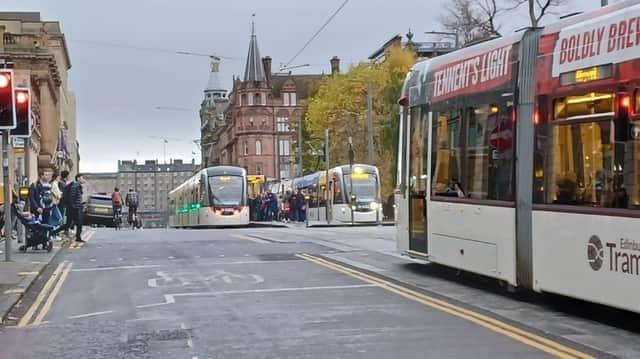Union blasts trams boss pay row claims of 'unreasonable demands' as strike looms
and live on Freeview channel 276
More than 100 tram workers are set to strike on 17 November after Edinburgh Trams backtracked on a sick pay review promise in a pay deal that averted planned strikes during the fringe festival.
In response to the strike action notice served on Wednesday the transport company accused the union of "demanding further improvements to sick pay that are simply unaffordable for the network” as it continues its recovery from the impact of the Covid-19 pandemic. But Unite has blasted the claim as ‘propaganda’ and stressed that strike will go ahead because the ALEO failed to honour a key part of a long-fought pay deal.
Advertisement
Hide AdAdvertisement
Hide AdUnite members backed the deal ‘overwhelmingly’ including a £2300 increase to salary, additional annual leave days for long service and no compulsory redundancies for three years. In the final agreement seen by the Evening News – signed in July by Managing Director Lea Harrison and Steve Mason, Chairman of Unite – there is also a commitment from Edinburgh Trams to review sick pay. It states: "A commitment to review the Sick Pay Scheme, with Unite the Union, to increase to 6 months full pay, then 6 months half pay, for staff diagnosed with long term and critical illness.”


At the time long term sickness was defined as from four weeks or more. Since then the company has changed the period of qualification to 12 weeks. In a two page memo to staff Mr Harrison said he was disappointed in the decision to strike, stressing that the company had made ‘positive outcomes’ on four out of five key terms of the deal and offered “a way forward” on sick pay.
For those classed as on long-term sickness the company said it had reviewed this and concluded it couldn’t provide this at this time. Mr Harrison stated. “Due to potential increase in sickness absence, and the cost of implementing the requested change (6 weeks to 12 months paid sick pay), we cannot agree to this at this time. However, as previously agreed, along with company’s pension contributions, there should be one of the first issues for consideration at future annual wage negotiations. We cannot, however, lose sight of the fact the business is still in COVID recovery mode, and we are still projecting a shortfall in revenue for the foreseeable future.”
Defending the decision to defer long-term sick pay increase, Mr Harrison explained the company had “simplified” the review process by separating Critical Illness and Long-Term Sickness. For those who are critically ill the proposal is now to conduct a review after 4-6 weeks and if criteria for illness cover is met, staff could get 80 per cent of their salary for up to a year.
Advertisement
Hide AdAdvertisement
Hide AdLyn Turner, Regional Officer for Unite said: “It’s in black and white that they committed to review sick pay and increase it to 6 months full pay then 6 months half pay. But they are not going to honour that. Yet they are suggesting we are somehow making additional or unreasonable demands. It’s propaganda. They are not justified in reneging on this deal when there are executive bonuses paid out. It seriously calls into question how we can negotiate with them in good faith, when they are not sticking to what was already agreed.”
Comment Guidelines
National World encourages reader discussion on our stories. User feedback, insights and back-and-forth exchanges add a rich layer of context to reporting. Please review our Community Guidelines before commenting.